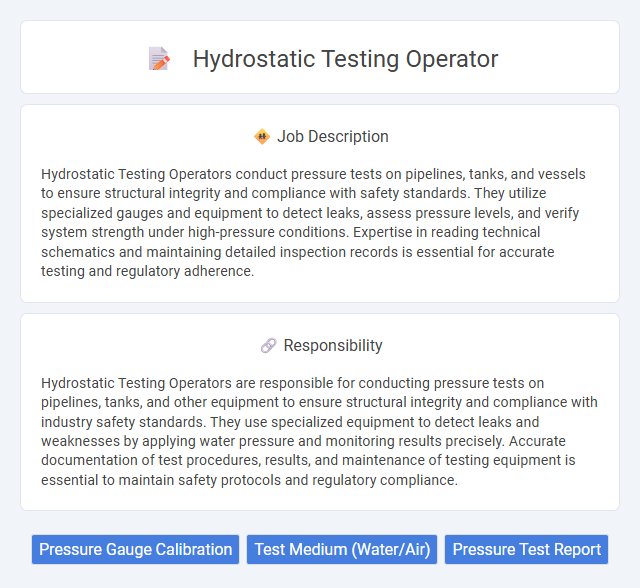
Hydrostatic Testing Operators conduct pressure tests on pipelines, tanks, and vessels to ensure structural integrity and compliance with safety standards. They utilize specialized gauges and equipment to detect leaks, assess pressure levels, and verify system strength under high-pressure conditions. Expertise in reading technical schematics and maintaining detailed inspection records is essential for accurate testing and regulatory adherence.
Candidates with good physical stamina and the ability to work in confined spaces are likely suitable for a Hydrostatic Testing Operator position, as the job often involves handling heavy equipment and performing repetitive tasks under varying environmental conditions. Individuals who can maintain focus and follow strict safety protocols might have a higher probability of success in this role. Those prone to claustrophobia or with limited physical endurance may find the demands of this occupation challenging.
Qualification
Hydrostatic Testing Operators must possess a strong understanding of pressure testing procedures, safety regulations, and equipment operation to ensure integrity and compliance in industrial systems. Qualifications typically include a high school diploma or equivalent, specialized training in hydrostatic testing standards, and certification in pressure vessel inspection or non-destructive testing methods. Experience with interpreting technical drawings, performing leak detection, and maintaining detailed test records is essential for accurate and reliable performance in this role.
Responsibility
Hydrostatic Testing Operators are responsible for conducting pressure tests on pipelines, tanks, and other equipment to ensure structural integrity and compliance with industry safety standards. They use specialized equipment to detect leaks and weaknesses by applying water pressure and monitoring results precisely. Accurate documentation of test procedures, results, and maintenance of testing equipment is essential to maintain safety protocols and regulatory compliance.
Benefit
Hydrostatic Testing Operator roles likely offer benefits such as specialized skill development in pressure testing and equipment inspection. Opportunities for career advancement may be probable due to the demand for safety compliance in industrial settings. Workers could expect competitive wages and potential health and safety benefits tied to their critical role in ensuring system integrity.
Challenge
Hydrostatic Testing Operators likely face the challenge of maintaining safety and accuracy under high-pressure conditions, where precision is critical to prevent equipment failure. The role probably demands strong attention to detail and mechanical aptitude to correctly conduct tests on various industrial components. Operators may also encounter difficulties managing complex testing procedures while adhering to strict regulatory standards and timelines.
Career Advancement
Hydrostatic Testing Operators play a critical role in ensuring the integrity and safety of pipelines and pressure vessels by conducting high-pressure tests. Career advancement opportunities include progressing to supervisory positions, quality control management, or specializing in non-destructive testing methods. Gaining certifications in safety standards and advanced testing techniques significantly enhances prospects for leadership roles within the oil and gas or manufacturing industries.
Key Terms
Pressure Gauge Calibration
Hydrostatic Testing Operators specialize in pressure gauge calibration to ensure accurate and reliable readings during pressure tests on pipelines, tanks, and other pressure vessels. They use precision instruments and follow strict industry standards such as API and ASME to verify gauge accuracy, preventing potential safety hazards and equipment failures. Mastery in interpreting calibration results and performing adjustments is critical for maintaining compliance with safety regulations and quality assurance protocols.
Test Medium (Water/Air)
Hydrostatic Testing Operators specialize in pressure testing pipelines, tanks, and vessels using test mediums such as water or air to verify structural integrity and detect leaks. Water is the preferred test medium for its incompressibility and safety, allowing accurate pressure measurements without the risk of explosive decompression. Air testing, while riskier due to compressibility and stored energy, is utilized when water is unavailable or inappropriate, requiring strict adherence to safety protocols.
Pressure Test Report
A Hydrostatic Testing Operator is responsible for conducting pressure tests on pipelines, tanks, and vessels to ensure structural integrity and leak resistance. The Pressure Test Report generated during these tests includes detailed data such as test pressure, duration, temperature, and observation of any pressure drops or leaks. Accurate documentation in the report is critical for compliance with industry standards and regulatory requirements.
 kuljobs.com
kuljobs.com